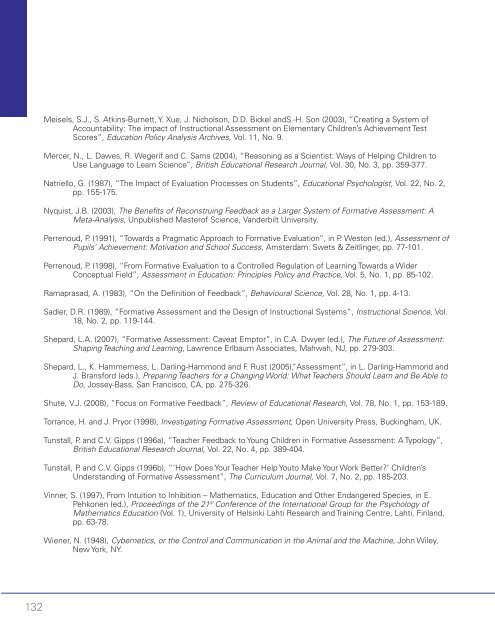del aprendizaje
2aGaJxc
2aGaJxc
Create successful ePaper yourself
Turn your PDF publications into a flip-book with our unique Google optimized e-Paper software.
Meisels, S.J., S. Atkins-Burnett, Y. Xue, J. Nicholson, D.D. Bickel andS.-H. Son (2003), “Creating a System of<br />
Accountability: The impact of Instructional Assessment on Elementary Children’s Achievement Test<br />
Scores”, Education Policy Analysis Archives, Vol. 11, No. 9.<br />
Mercer, N., L. Dawes, R. Wegerif and C. Sams (2004), “Reasoning as a Scientist: Ways of Helping Children to<br />
Use Language to Learn Science”, British Educational Research Journal, Vol. 30, No. 3, pp. 359-377.<br />
Natriello, G. (1987), “The Impact of Evaluation Processes on Students”, Educational Psychologist, Vol. 22, No. 2,<br />
pp. 155-175.<br />
Nyquist, J.B. (2003), The Benefits of Reconstruing Feedback as a Larger System of Formative Assessment: A<br />
Meta-Analysis, Unpublished Masterof Science, Vanderbilt University.<br />
Perrenoud, P. (1991), “Towards a Pragmatic Approach to Formative Evaluation”, in P. Weston (ed.), Assessment of<br />
Pupils’ Achievement: Motivation and School Success, Amsterdam: Swets & Zeitlinger, pp. 77-101.<br />
Perrenoud, P. (1998), “From Formative Evaluation to a Controlled Regulation of Learning Towards a Wider<br />
Conceptual Field”, Assessment in Education: Principles Policy and Practice, Vol. 5, No. 1, pp. 85-102.<br />
Ramaprasad, A. (1983), “On the Definition of Feedback”, Behavioural Science, Vol. 28, No. 1, pp. 4-13.<br />
Sadler, D.R. (1989), “Formative Assessment and the Design of Instructional Systems”, Instructional Science, Vol.<br />
18, No. 2, pp. 119-144.<br />
Shepard, L.A. (2007), “Formative Assessment: Caveat Emptor”, in C.A. Dwyer (ed.), The Future of Assessment:<br />
Shaping Teaching and Learning, Lawrence Erlbaum Associates, Mahwah, NJ, pp. 279-303.<br />
Shepard, L., K. Hammerness, L. Darling-Hammond and F. Rust (2005),“Assessment”, in L. Darling-Hammond and<br />
J. Bransford (eds.), Preparing Teachers for a Changing World: What Teachers Should Learn and Be Able to<br />
Do, Jossey-Bass, San Francisco, CA, pp. 275-326.<br />
Shute, V.J. (2008), “Focus on Formative Feedback”, Review of Educational Research, Vol. 78, No. 1, pp. 153-189.<br />
Torrance, H. and J. Pryor (1998), Investigating Formative Assessment, Open University Press, Buckingham, UK.<br />
Tunstall, P. and C.V. Gipps (1996a), “Teacher Feedback to Young Children in Formative Assessment: A Typology”,<br />
British Educational Research Journal, Vol. 22, No. 4, pp. 389-404.<br />
Tunstall, P. and C.V. Gipps (1996b), “‘How Does Your Teacher Help Youto Make Your Work Better?’ Children’s<br />
Understanding of Formative Assessment”, The Curriculum Journal, Vol. 7, No. 2, pp. 185-203.<br />
Vinner, S. (1997), From Intuition to Inhibition – Mathematics, Education and Other Endangered Species, in E.<br />
Pehkonen (ed.), Proceedings of the 21 st Conference of the International Group for the Psychology of<br />
Mathematics Education (Vol. 1), University of Helsinki Lahti Research and Training Centre, Lahti, Finland,<br />
pp. 63-78.<br />
Wiener, N. (1948), Cybernetics, or the Control and Communication in the Animal and the Machine, John Wiley,<br />
New York, NY.<br />
132


